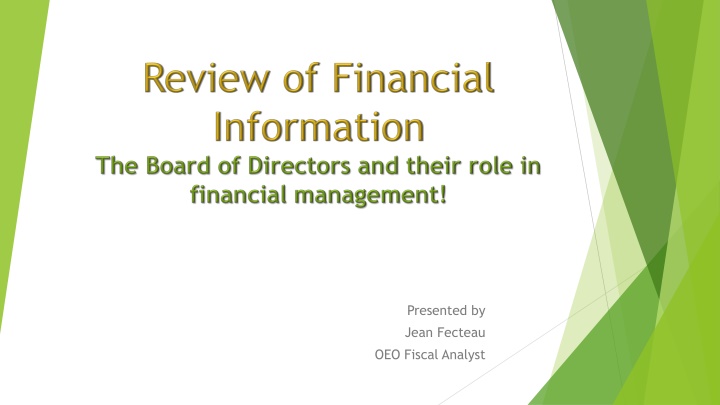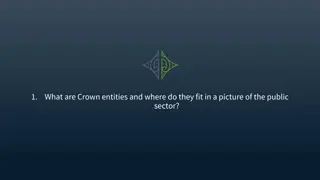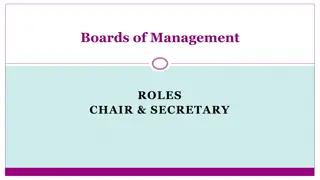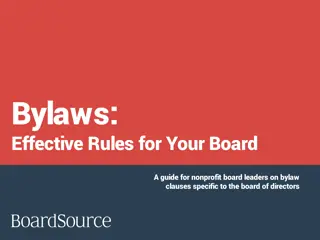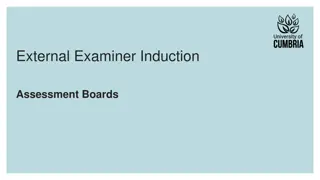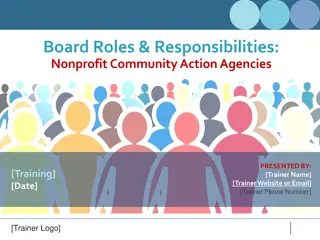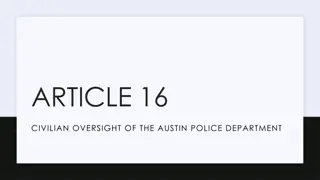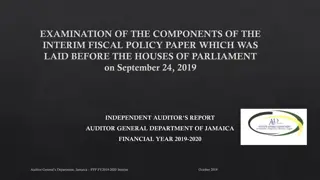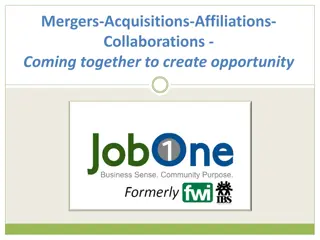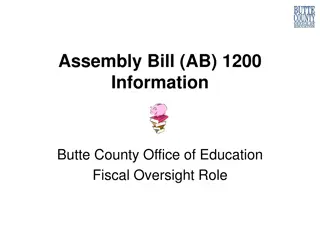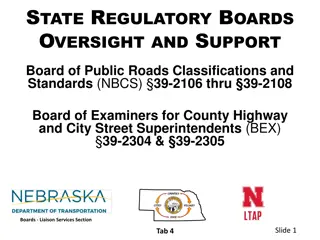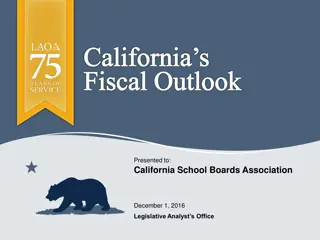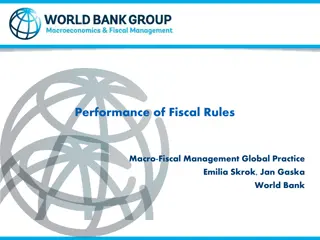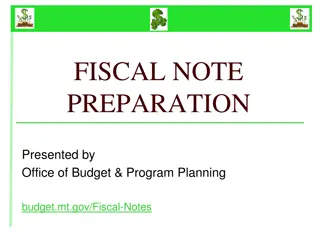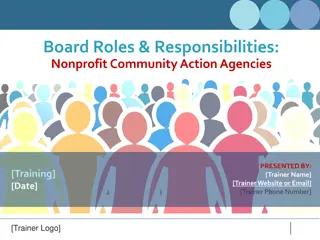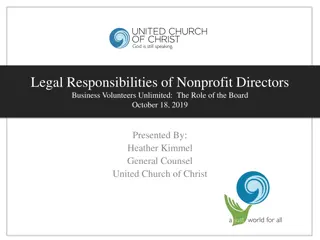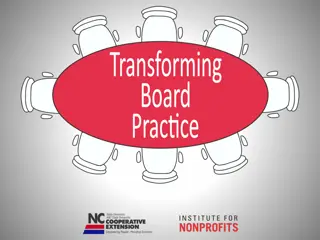Fiscal Oversight and Responsibilities for Nonprofit Boards
Understand the basic requirements and responsibilities of nonprofit Boards in fiscal oversight, assessing members' financial knowledge, establishing Finance Committees, and adhering to Organizational Standards. Learn about the fiduciary responsibilities of Boards, setting up different Committees, and the specific responsibilities of the Finance Committee in managing budgets, assets, and investments. Discover key questions Boards should ask to ensure financial stability and prevent errors. Emphasizing the primary goal of fiscal responsibility for nonprofit Boards.
Download Presentation

Please find below an Image/Link to download the presentation.
The content on the website is provided AS IS for your information and personal use only. It may not be sold, licensed, or shared on other websites without obtaining consent from the author.If you encounter any issues during the download, it is possible that the publisher has removed the file from their server.
You are allowed to download the files provided on this website for personal or commercial use, subject to the condition that they are used lawfully. All files are the property of their respective owners.
The content on the website is provided AS IS for your information and personal use only. It may not be sold, licensed, or shared on other websites without obtaining consent from the author.
E N D
Presentation Transcript
Presented by Jean Fecteau OEO Fiscal Analyst
Objectives: Understand basic requirements and responsibilities relative to the Board s fiscal oversight; Understand the importance of assessing each Board members fiscal knowledge; Understand the value of a Finance Committee; and Understanding the Organizational Standards related to Board of Directors.
Board Responsibilities Board of Directors have a fiduciary responsibility to ensure that the assets of the nonprofit are used in accordance with donors/funders intent, and supports the agency s charitable mission. Board of Directors should maintain and monitor financial accountability of their organization, acting as trustees of the organization s assets that includes timely review of financial reports and advance planning to ensure the agency s financial situation remains sound.
Committees the Board of Directors should consider establishing: Executive Committee Finance Committee Membership/Nominating Committee Audit Committee Fundraising Committee By-Laws Committee
Finance Committee Responsibilities: Review and approve the annual budget and submit it for approval by the full Board; Review the organization's revenues and expenditures on a regular basis if Board does not meet monthly; Assist in the maintenance of agency assets; Assist in the management of organizational investments; Provide direction for the entire Board for fiscal responsibility.
Questions that the Board of Directors should be asking. Is our financial plan consistent with our strategic plan? Is our cash flow projected to be adequate? Do we have sufficient reserves? Are any specific expense areas rising faster than their sources of income? Are we regularly comparing our financial activity with what we have budgeted? Are our expenses appropriate? Do we have the appropriate checks and balances to prevent errors, fraud, and abuse? Fiscal Responsibility Primary Goal of Board of Directors Gelman, Rosenberg & Freedman CPAs is a member of CPAmerica International January 26, 2015 (Questions adapted from The Financial Responsibilities of Nonprofit Boards by Andrew Lang.)
Questions that should be asked related to each member of the Board of Directors? What are the fiscal strengths each Board member brings to the table? Do Board members complete a fiscal knowledge assessment? What Board training is needed to understand financial reporting? How often should the Board review the expenditures and financial reports of the agency? What reports need to be presented to the Board to meet Organizational Standards requirements?
What can the Board of Directors do to strengthen fiscal knowledge? 1. Have all Board members take a financial management self-assessment. 2. Provide training on the agency policies and procedures for Board knowledge of purchase levels, approval requirements and financial controls. 3. Read your financial information and ask questions! 4. Volunteer to be on the Finance or Audit committee!
How does a financial management self-assessment assist the Board? Helps Board understand the state of agency finances; Identify strengths and weaknesses of member fiscal knowledge Assists in targeting Board fiscal training Assists in helping Board understand fiscal responsibilities Assists in healthier financial practices and processes Assists in addressing critical financial issues or events
What do you look for in your financial reviews? 1. Budget to actual reports for large variances; 2. Balances on financial statements for solvency; 3. Large multiple purchases of same vendor; 4. Ask fiscal staff about any unusual expenditures that occurred during period; 5. What issues, if any, does the fiscal office need assistance?
Websites with assessment tools. Http://nonprofitoregon.org/sites/default/files/uploads/file/Fin%20Mgmt%20S elf%20Assessment.pdf Nonprofit Financial Management Self Assessment Tool https://nonprofitsassistancefund.org/resources/item/financial-self- assessment Financial Management Self-Assessment https://www.councilofnonprofits.org/tools-resources/self-assessments- nonprofit-boards Board of Directors Full Board Evaluation
Organizational Standards related to Fiscal Management Category 8: Financial Operations and Oversight The Organization s annual audit (or audited financial statements) is completed by a Certified Public Accountant on time in accordance with Title 2 of the Code of Federal Regulations, Uniform Administration Requirements, Cost Principles, and Audit Requirement (if applicable) and/or State audit threshold requirements. Standard 8.1 Standard 8.2 assessed by the organization and addressed where the governing board has deemed it appropriate. All findings from the prior year s annual audit have been Standard 8.3 board. The organization s auditor presents the audit to the governing
Standard 8.4 audit. The governing board formally receives and accepts the Standard 8.5 the past 5 years. The organization has solicited bids for its audit within Standard 8.6 available to the governing board for review. The IRS Form 990 is completed annually and made Standard 8.7 regular meeting that include the following: The governing board receives financial reports at each 1. Organization-wide report on revenue and expenditures that compares budget to actual, categorized by program; and 2. Balance sheet/statement of financial position.
Standard 8.8 withholdings are completed on time. All required filings and payments related to payroll Standard 8.9 wide budget. The governing board annually approves an organization- Standard 8.10 within the past 2 years, updated as necessary, with changes approved by the governing board. The fiscal policies have been reviewed by staff Standard 8.11 been reviewed by the governing board within the past 5 years. A written procurement policy is in place and has Standard 8.12 costs through an indirect cost rate or through a written cost allocation plan. The organization has a written policy in place for record retention and destruction. The organization documents how it allocates shared Standard 8.13
In Summary All Boards should have a finance committee and possibly an Audit Committee; Boards should perform an annual financial assessment of Board member financial knowledge; Board Members should receive financial information prior to Board meetings and review information, prepared to ask questions; Engage in fiscal training that will assist all members with their fiduciary responsibilities; Know your agency's policies and procedures; Ensure the Board is fully engage with the Organizational Standards related to Financial Management
Books to Reference: Financial Responsibilities of Nonprofit Boards How to Read Nonprofit Financial Statements
